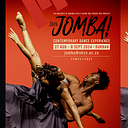“But still walking till this day”
By Marcia Mzindle (Guest Writer)
As we draw to the close of the 24th Jomba! festival, our thirst quenched and our spirits fed, the mood at the Sneddon theatre still soars high. On Thursday 8 September we gather watch the performance of Mamela Nyamza (South Africa) titled Grounded to keep burning the spark in our hearts. The performance is done in collaboration with her son Amkele Mandla.
As we walk in, chairs are placed on the stage some on the left and the other on the right. In the centre, a narrow rectangular stage is set. It stands slightly elevated from the ground with tiny parcan lights perched around it and two microphones positioned at the front one left and another on the right.
As the audience, we are encouraged to occupy the seats on the stage, as I take my seat on the stage this reminds me of a gathering around the campfire as a child, to listen to stories from our elders.
Once we settle the house lights go down and Nyamza walks onto the stage. She stands in Balletic first position in a shimmering silver sleeveless dress that mimics a ballerina tutu. A spotlight shines on her as her toes move in upward motions and curl back to a flat relaxed position.
A voiceover plays as she stands on her toes, graceful yet never seeming to find balance, she staggers controlled, bends controlled, and steady, her heels never touching the ground. A poetic juxtaposition. The voiceover shifts from English to isiXhosa. It details her journey of walking, tippy-toeing, dancing and living in her body.
Nyamza, a powerful stage presence, confident and commanding, is also rendered vulnerable in this moment. This staggering dancer on her toes has me thinking of the divide that I have been witnessing within myself over the last few years. This divide between the unlearning of some westernised teachings especially in relation to how I view myself as a Black African woman. The politics of the white gaze, the cultured body versus the so-called non-cultured one. The learnings of African teachings I had not been guided to, and learning to embrace these. I have been having these internal conversations trying to understand what this means for me in the present the answers are a constant finding, learning and unlearning.
“Molweni!” Nyamza, with a warm bright smile greets us mid-performance and we are ushered into a rich history of who she is from, the bloodline she carries with a special focus on her mother, grandmother and her son Amkele whom she invites into the stage. He takes the stage accompanied by hip hop musical beat, microphone in hand he starts rapping. In his lyrics searching, questioning, he calls on his forefathers oMthembu, oMvelase…
As his rap draws to a conclusion, he takes a seat on one of the chairs placed on the stage next to audience members. What transpires from there is the most vulnerable, open, intimate conversation between mother and son. The conversation takes form in a question-answer format giving us a glimpse of understanding of the background of two intergenerational performers. The conversation moves from culture, peer pressure, relationships, family dynamics, growing in a time without technology vs a time that is technologically advanced. Colonialism and the effects it had on the naming and history of Black people. Tradition and Culture (and questions of ‘then and now’ that consume these). Weight and perspective are given from both sides as mother and son reach from their inside to impart their bare selves unto us and draw strength from each other.
I am left moved at this offering, and questioning if some of our Black African mothers would ever open up to us in this manner, or would we have to remember them as strong women only. ‘Izibhokodo’, rocks that could never be moved or let us in, because of fear, because on not having freedom or space to do so. Because of teachings they were exposed to…because a child must know their place. If we ourselves could ever own/acknowledge our African names and be called by them, if our hard names would one day be easy to pronounce. I am also left with hope that we are finding our home…within ourselves. We are figuring out who we are as Black people in the face of our postcolonial presence.
Though our feet may be muddy, we have danced, stood on our toes, shuffled, swayed, shifted in ways that required us to be. It may have been hard, frightening, exhilarating and humbling…but we still walking till this day and we will continue to…
